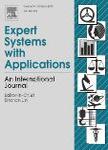版权所有:内蒙古大学图书馆 技术提供:维普资讯• 智图
内蒙古自治区呼和浩特市赛罕区大学西街235号 邮编: 010021

作者机构:Department of Computer Science and Information Engineering Southern Taiwan University of Technology No. 1 Nantai St. Yung-Kang City Tainan 710 Taiwan Department of Engineering Science National Cheng Kung University No. 1 Ta-Hsueh Road Tainan 701 Taiwan
出 版 物:《Expert Systems with Applications》 (Expert Sys Appl)
年 卷 期:2009年第36卷第1期
页 面:616-624页
核心收录:
学科分类:08[工学] 0835[工学-软件工程] 0701[理学-数学] 0812[工学-计算机科学与技术(可授工学、理学学位)]
主 题:Particle swarm optimization (PSO)
摘 要:One aim of testing is to identify weaknesses in students knowledge. Computerized tests are now one of the most important ways to judge learning, and, selecting tailored questions for each learner is a significant part of such tests. Therefore, one current trend is that computerized adaptive tests (CATs) not only assist teachers in estimating the learning performance of students, but also facilitate understanding of problems in their learning process. These tests, must effectively and efficiently select questions from a large-scale item bank, and to cope with this problem we propose a dynamic question generation system for web-based tests using the novel approach of particle swarm optimization (PSO). The dynamic question generation system is built to select tailored questions for each learner from the item bank to satisfy multiple assessment requirements. Furthermore, the proposed approach is able to efficiently generate near-optimal questions that satisfy multiple assessment criteria. With a series of experiments, we compare the efficiency and efficacy of the PSO approach with other approaches. The experimental results show that the PSO approach is suitable for the selection of near-optimal questions from large-scale item banks. © 2007 Elsevier Ltd. All rights reserved.